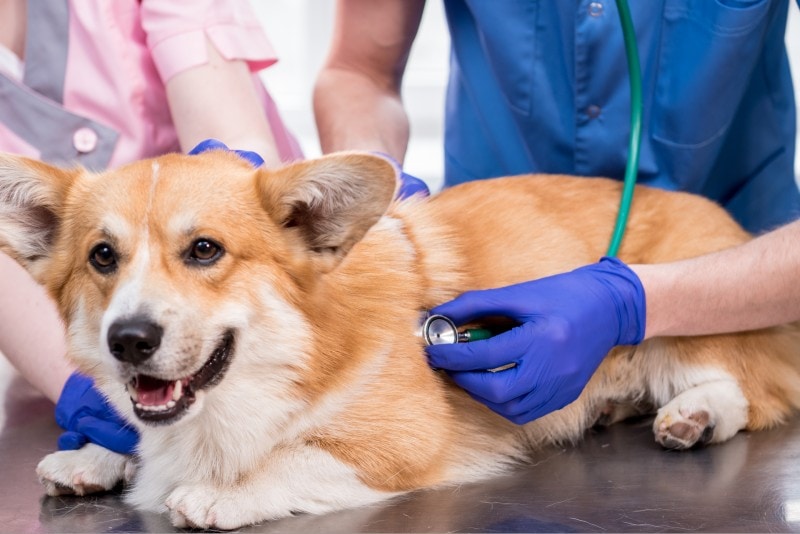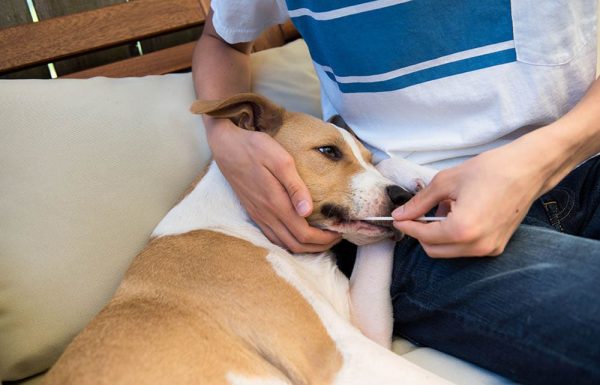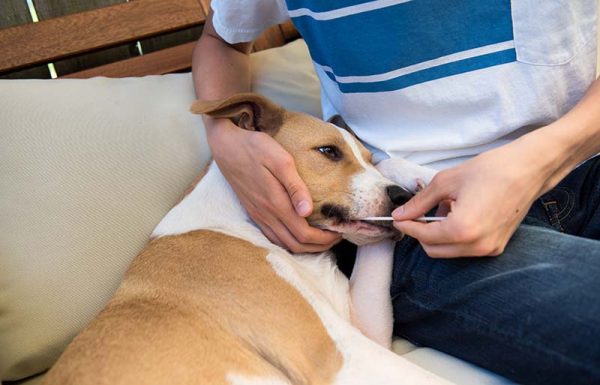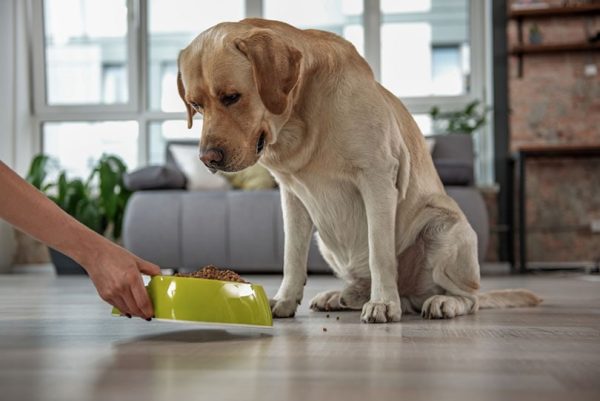You will certainly need to call the vet if your dog is throwing up blood. There are many different reasons for this and while not all are extremely serious, you should still get a vet’s opinion.
Dogs vomiting blood, while always considered an urgent matter, is especially dangerous if they are also lethargic or collapsed, pale, they swallowed a foreign object, it’s a lot of blood, or they had access to any toxin.
Read on below to find out more.

How Can You Tell If Your Dog Has Vomited Blood?
Hematemesis or the presence of blood in vomit can be pretty hard to differentiate in dogs. However, a couple of ways can help you identify blood in your dog’s vomit.
Blood can be present in vomit in different colors.1 If it’s dark or looks like coffee grounds, while rare, it is an extreme emergency. This is blood that has been digested, which means that your dog could have a stomach ulcer, a clotting problem or cancer, they may have swallowed a foreign object, or have any other serious medical condition. When it’s dark, it’s time to take them to an emergency vet.
Red-colored blood means that it’s likely not digested, but this condition can still be serious. This could mean your dog has been vigorously vomiting or something has damaged your dog’s throat, esophagus, or stomach, but it can also be related to a toxin ingestion or a clotting disorder.
If your dog is throwing up mucus alongside blood, you could be looking at a medical problem within the upper intestines or stomach. Your dog may not be able to keep anything they eat down, so be sure to withhold food and restrict their water intake, and get them checked out by your vet. The more blood your dog throws up, the worse.
If it’s a lot of blood, it’s definitely a cause for concern. While any amount of blood is dangerous for your dog, it’s especially important to take them to the vet urgently if there is a large amount of blood in their vomit. This is because too much blood in vomit can cause rapid blood loss and collapse, which can be an extreme medical emergency for your dog.

When Should I Call the Vet?
You need to call the vet right away, no matter how much blood or what color the blood is, and they will advise you on what to do next and if your dog needs to be seen straight away. However, there are a few things to look out for to determine whether you need to take your dog to an emergency vet outside of normal working hours.
You need to take your dog to the vet urgently if you notice that they are having other signs of severe illness, primarily, look for changes in behavior with your dog. If your dog is lethargic and weak, not wanting to get up or walk, has pale gums, does not want to eat or drink or can’t keep anything down, seems to be in pain, has a tense or distended abdomen, or has any other sign alongside vomiting blood, that is a cause for major concern.
On the other hand, if your dog has vomited a tiny amount of blood stained stomach content, after vomiting some food, mucus, or bile, and they are otherwise fine in themselves and bright, then you can withhold food and call your vet to get their advice. In this case, you don’t need to rush them to the emergency clinic.
If you are unsure if a vet visit is necessary, you can talk to a vet online first for guidance on the next steps.
If you need to speak with a vet but can't get to one, head over to PangoVet. It's our online service where you can talk to a vet online and get the advice you need for your pet — all at an affordable price!
However, if your dog has vomited a lot of blood or vomited dark blood, take them to the vet immediately.
Try to take pictures of the vomit or get some samples for your vet. It’s okay if you can’t, but it can help the veterinarian a lot when it comes to figuring out what is wrong with your dog. However, don’t wait for this and take your dog to the vet as soon as you can—don’t waste time trying to collect a sample or inspect the blood.

Possible Reasons Your Dog is Vomiting Blood
There are multiple reasons why your dog could be vomiting blood:
- Blood clotting disorder
- Pancreatitis
- Parvovirus
- Giardiasis
- Stomach inflammation
- Stomach ulcer
- Cancer
- Cuts from a sharp object
- Bacterial infection
- Addison’s disease
- Hemorrhagic gastroenteritis
- Inflammatory bowel disease
- Medication side effects
- Toxin ingestion
- Kidney disease
- Ingestion of coughed-up blood
Most of these conditions are extremely serious, while some will be slightly less worrying. It’s impossible to know without a vet’s examination, though.

FAQ
Can a dog throw up blood and be okay?
While dogs throwing up blood is concerning, it can be okay as long as you catch it early and get them checked out by your vet promptly. They may require investigations and medical treatment, such as antiemetics (drugs that reduce vomiting) and gastric protectants, or they could need surgery or intensive care, if they have a ruptured stomach ulcer. In general, it’s hard to give a yes or no answer because the reasons they are vomiting blood can be varied, and the severity depends on what’s causing it.
What do vets do when dogs vomit blood?
The first thing the vet will do is ask about the appearance and amount of blood, history and when it first started, if there have been any other signs of illness, or possible toxin exposure. They will do a physical exam to assess the condition of the patient, address dehydration, and give supportive care. To have a better understanding of the situation, they will do multiple tests and perform imaging techniques to try to rule out different conditions that could possibly be causing blood in your dog’s vomit.
When they are done with the tests and have successfully figured out what has caused this, then they will start treatment, which based on the underlying cause, may range from anti nausea drugs, stomach protectants, antibiotics, activated charcoal, and other symptomatic medications. In case of a ruptured ulcer in the dog’s stomach or intestine, the vet will need to perform surgery, and will need to keep them overnight for monitoring.


Conclusion
Finding out your dog has vomited blood is a scary moment. However, as long as you call the vet and get a professional’s opinion quickly, the chances of your dog getting home safely will improve tremendously.
There are many different things that can cause blood within your dog’s vomit, ranging from not-so-severe to extremely severe and life-threatening. Be sure to call the vet as soon as you notice that your dog has vomited blood. Even if it turns out what you think is blood isn’t actually blood, it’s better to be safe than sorry.
Featured Image Credit: Ground Picture, Shutterstock



















